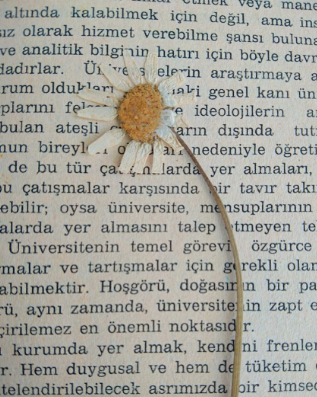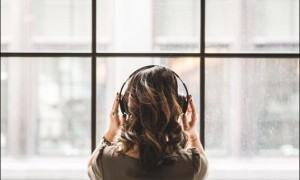My parents owned six books between them. Two of those were Bibles and the third was a concordance to the Old and New Testaments. The fourth was The House At Pooh Corner. The fifth,The Chatterbox Annual 1923 and the sixth, Malory’s Morte d’Artliur.
I found it necessary to smuggle books in and of the house and I cannot claim too much for the provision of an outside toilet when there is no room of one’s own. It was on the toilet that I first read Freud and D. H. Lawrence, and perhaps that was the best place, after all. We kept a rubber torch hung on the cistern, and I had to divide my money from a Saturday job, between buying books and buying batteries. My mother knew exactly how long her Ever Readys would last if used only to illuminate the hap that separated the toilet paper from its .
once I had tucked the book back down my knickers to get it indoors again, I find somewhere to hide it, and anyone with a single bed, standard size, and paperbacks, standard size, will discover that seventy seven can be accommodated per layer under the mattress. But as my collection grew, I began to worry that my mother might notice that her daughter’s bed was rising visibly. One day she did. She burned everything.
I had been brought up to memorize very long Bible passages, and when I left home and was supporting myself so that I could continue my education, I fought off loneliness and fear by reciting. In the funeral parlor I whispered Donne to the embalming fluids and Marvell to the corpses. Later, I found that Tennyson’ s ‘Lady of Shalott’ had a soothing, because rhythmic, effect on the mentally disturbed. Among the disturbed I numbered myself at that time.
The healing power of art is not a rhetorical fantasy. Fighting to keep language, language became my sanity and my strength. It still is, and I know of no pain that art cannot assuage. For some, music, for some, pictures, for me, primarily, poetry, whether found in poems or in prose, cuts through noise and hurt, opens the wound to clean it, and then gradually teaches it to heal itself. Wounds need to be taught to heal themselves.
The psyche and the spirit do not share the instinct of damaged body. Healing is automatically triggered nor is danger usually avoided. Since we put ourselves in the way of hurt it seems logical to put ourselves in the way of healing. Art has more work to do than ever before but it can do that work. In a self-destructive society like our own, it is unsurprising that art as a healing force is despised.
For myself, when I returned to my to my borrowed room night after night, and there were my books, I felt relief and exuberance, not hardship and exhaustion. I intended to avoid the fate of Jude the Obscure, although a reading of that book was a useful warning. What I wanted did not belong to me by right and whilst it could not be refused tome in quite same way, we still have subtle punishments for anyone who insists on what they are and what they want. Walled inside the little space marked out for by family and class, it was the limitless world of imagination that it possible for me to scale the sheer face of other people’s assumptions. Inside books there is perfect space and it is that space which allows the reader to escape from the problems of gravity.
By Jeanette Winterson

参考译文
艺术与生命
我父母两人共有六本书。其中两本是圣经、第三本是新旧约用语索引、第四本是《噗噗熊街角的屋子》(The House at Pooh Corner)、第五本是《1923年话匣子年鉴》(The Chatterbox 1923 Annual),而第六本是马洛礼(Malory)的《阿瑟王之死》(Mortd’Arthur)。
我发现有必要把书偷运进出家里,而且没有属于自己的房间时,对于于屋外厕所的供应品,我不能要求太多。我第一次读到弗洛依德和D. H. 劳伦斯,是坐在马桶上的,而或许,那终究是最佳之处。我们在马桶水箱上悬吊了一个橡胶手电筒,而我必须将周六那份工作赚来的钱,平分花在买书和买电池上面。我母亲清楚知道,她那些永备牌电池,如果光是用来照明区分卫生纸和其功能的空隙,可以维持多久。
有一回我又把书塞在内裤里,好带进屋里。我必须找个地方把书藏起来,而任何人,若拥有一张单人床,标准尺寸的,以及平装书籍,标准尺寸的,就会发现,床垫底下每一层可容纳七十七本。可是当我的收集品增加时,便开始担心母亲会注意到,用眼睛就看得出女儿的床正逐渐升高。有一天她真的发现了。她全给烧了…。
……我成长过程中,必须背下很长的圣经段落。到我离开家庭,自己赚钱以便继续求学时,便靠背诵来抵挡寂寞和恐惧。在殡仪馆里,我稍稍对着防腐香料液念约翰 ?多恩(Donne)、对着尸体念安德鲁?马维尔(Marvel)。后来,我发现丁尼生(Tennyson)的〈夏洛特〉(“Lady of Shalott”),因为有节焰感,对于心智失衡者具有一种安抚作用。在那个时候我把自己也算在失衡者之列。
艺术的疗愈力量并非夸大其词的幻想。我奋力留住语言,语言因而让我心智正常,具有力量。到现在仍是如此,而且我所知道的痛苦,无一不透过艺术而得到舒缓。对某此人来说,是音乐,另一些人,是绘画,对我来说,是主要的是,不论出现在诗歌或散文中,诗能够切穿嘈杂和伤痛,将伤口打开以清理之,然后逐渐教导它自我疗愈。
心灵和精神不像受损了的身体具有一种本能。疗愈不会自动给引发,而危险也通常无以避免。既然我们会让自己受伤,那么让自己得到疗愈也是合乎逻辑的。比起以往任何时候,艺术要做更多的工作,但是这份工作它是做得来的。像我们这样一个自我毁灭的社会里,艺术之为一种疗愈的力量,会受到鄙视,并不令人感到讶异。
对我自己而言,夜复一夜回到借来的房里时,我感到放心且满溢,而非困苦和疲惫,我意图避免《无名裘德》(Jude the Obscure)的命运,虽然阅读那本书是很有用的警告。我所想要的,并不理当属于我,而虽然它也不能以完全同样的方式拒我于外,但是任何人若坚持要做某种人或是想要某些东西,我们仍然会给他很微妙的惩罚。当我被关在家庭和阶级为我所划定的小小空间里,是想象力那片无限的天地,让我得以刮除他人那些假设的表层。书中自有完美的空间,就是这个空间,让读者能够逃避地心引力的诸般问题。
詹涅特.温特森 著







